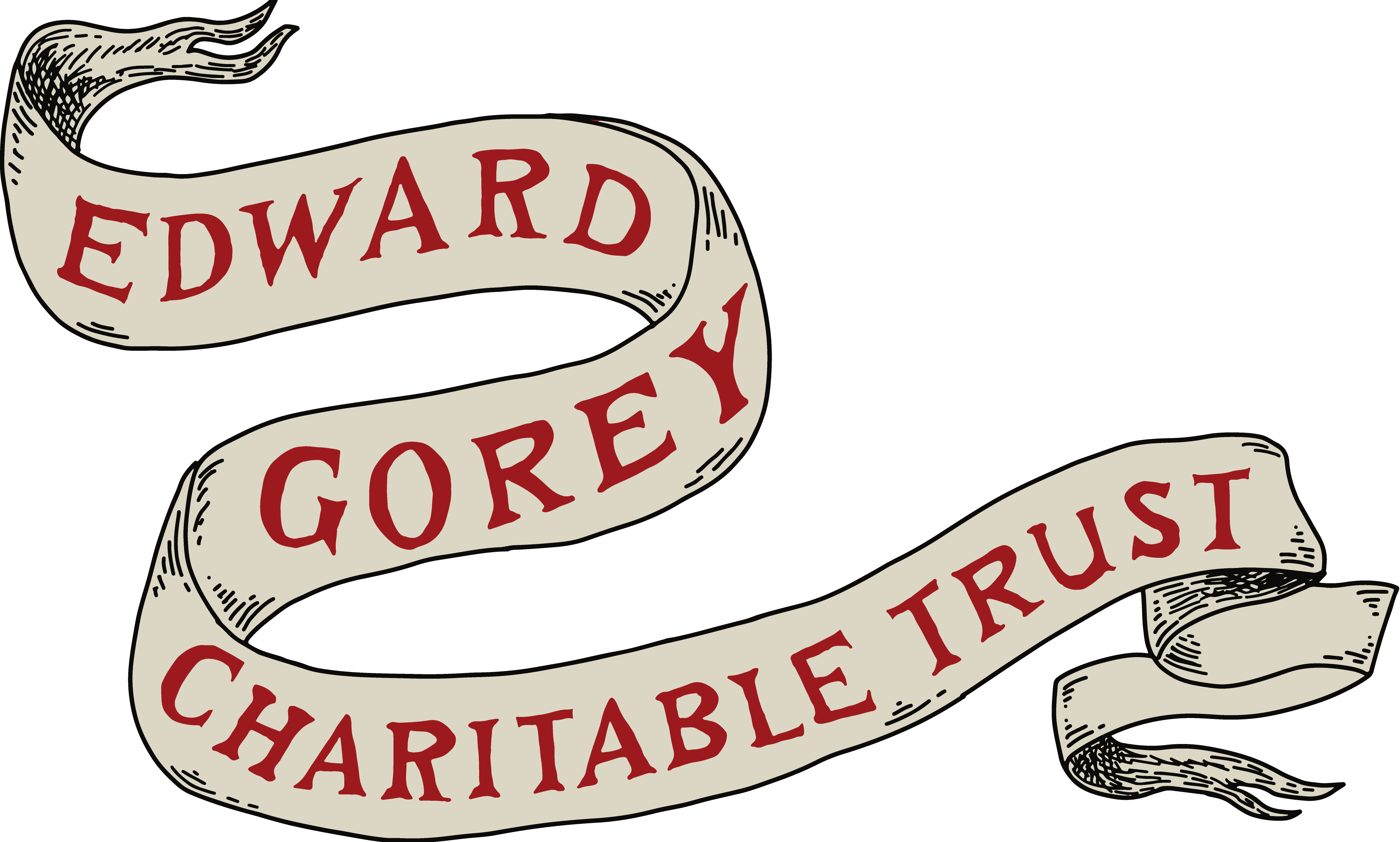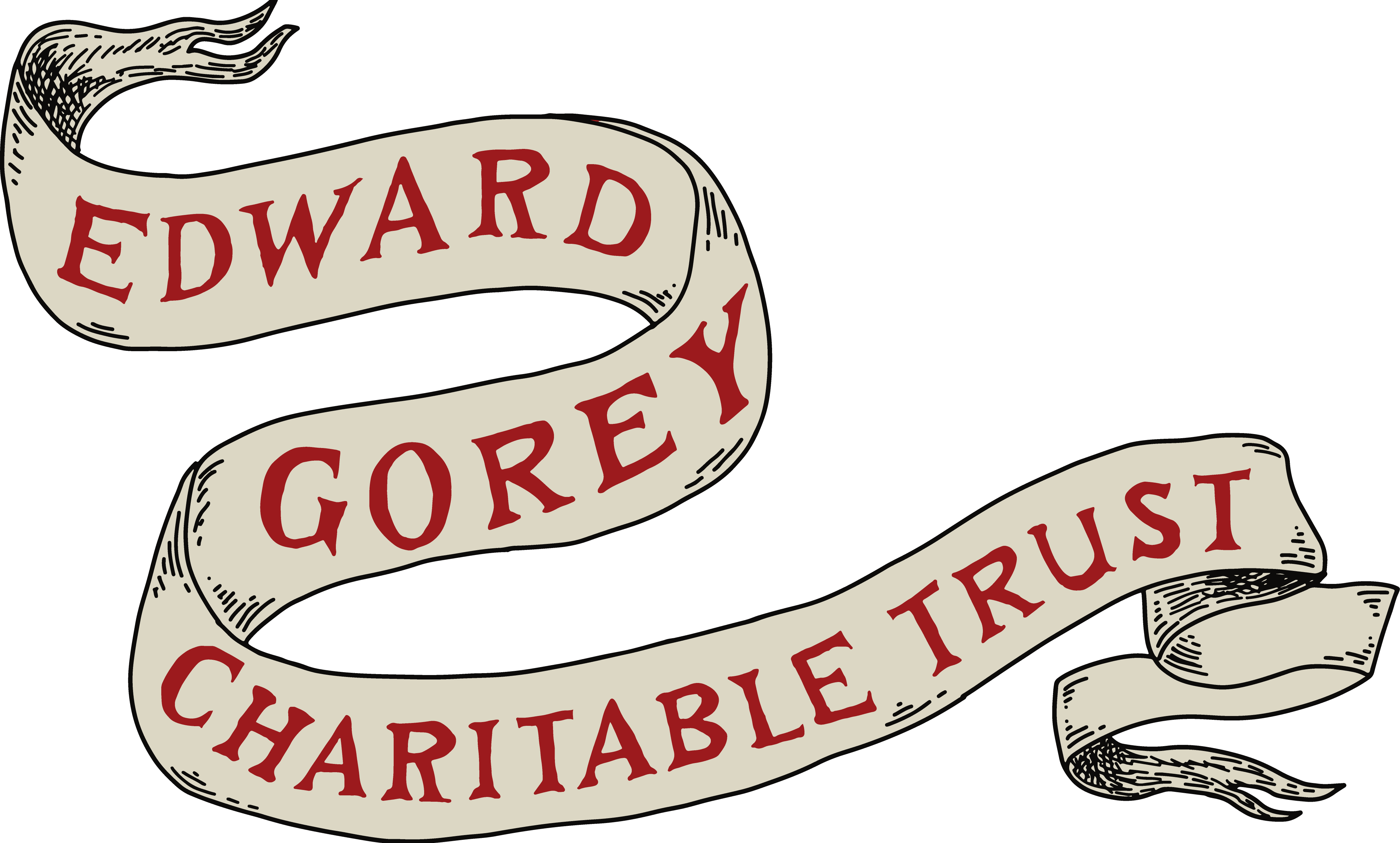Gorey Voices, the Oral History Project, is an initiative of The Edward Gorey Charitable Trust designed to preserve and advance the legacy of Edward Gorey. The Trust will be conducting a series of interviews with prominent members of the Gorey community. We are particularly interested in working with individuals who knew Edward Gorey personally or otherwise interacted with him, as well as those who have had rich experiences with his work, as collectors, scholars, or otherwise.
On March 24th, 2023, Alexander Theroux shared his experiences with Edward Gorey’s work and as a friend as part of the Trust’s oral history project.
When and where were you born? Could you tell us a little bit about you and your family?
I was born in Medford, Massachusetts in 1939, into a working-class family of seven, five boys and two girls. I am half-French, half-Italian, of Roman Catholic persuasion, live on Cape Cod, am happily married with two 9-year-old daughters, took my masters and doctorate degrees at the University of Virginia in 1964 and 1968, and have taught literature at Harvard, MIT, and Yale over the course of twenty years, along with having written 20 books of various kinds.
Where do you live now?
West Barnstable, Mass.
How would you describe your occupation?
I am a writer of fiction, non-fiction, essays, and poetry.
Did you know Edward Gorey personally?
I was happy to know Edward Gorey personally, for over a quarter of a century.
How, when, and where did you meet Edward Gorey?
When I was visiting my parents on Cape Cod in 1974, I stopped into a Yarmouth Port book shop and found and bought several books of Gorey’s. Upon paying for them, I was surprised when the bookshop owner quietly disclosed to me that the author actually lived nearby on Millway, right next to the Barnstable Harbor. I was frankly astonished – flabbergasted, actually — to hear that fact since I had long believed that he was a dead Englishman. Years before in London, when I was then living in Knightsbridge, I had bought several other books of his, which had been great favorites of mine. I immediately drove over to his house to try to meet him. He was very obliging. A girlfriend of mine who was with me took a photograph of us standing in front of his cousin’s house.

How would you describe your relationship?
Edward Gorey – close acquaintances called him “Ted,” a small group among which I eventually numbered myself – was a good friend, a close neighbor, and a frequent visitor of mine.
How would you describe Edward Gorey’s personality?
Gentle, kind, extravagant, witty, complicated, generous, unassuming, ironic, if not campy, mysterious to a degree, not religious, modest, a mad film-watcher, very much a loner, studiously remote, a matchless writer, artist, and illustrator, a man extremely pleasant to be with, a consummate artist, far and away the most well-read individual of my acquaintance, and a person no one ever really knew. He was also one of the very people I have ever known whom I would describe as being genius.
When did you first encounter Edward Gorey’s art and writing?
I first came across Ted’s books in various bookshops in London in 1970. When I was teaching at Harvard in the 1970s, I was assigned in 1974 to write an article on him for Esquire magazine, which appeared in that same year, titled by the magazine’s editors – inexplicable to me — “The Incredible Revenge of Edward Gorey.”
Do you have a favorite book or other piece of work by Gorey?
Every book of Gorey’s was scrupulously brilliant. I suppose, if I had to choose one, it would be a very early work of his titled The Unstrung Harp.
What attracts you to Gorey’s work?
The oblique wit, the extravagant line work, the matchless imagination, the expert and highly considered art in an Age of Shoddy.
He was, very like his work, seemingly simple but fiddly and involuted and complex. I do know that he loved the 19th-century novel, Agatha Christie’s books, and to a large degree bits from every movie he saw. He admired the poet W.H. Auden, read him in college, and would often quote lines of him at length. In the book that I wrote on Gorey, The Strange Case of Edward Gorey (Fantagraphics, 2000), I went to some length to compare the many congruities and incongruities in his short life. He should never have died at age 75. I believe Gorey’s stories and the meaning of his often arcane and outré work curiously blended into, if indeed didn’t in some way derive from, the idea of what the poet Auden often had in mind when he wrote that modern poetry “means and cannot help meaning more than and something different from what it expresses, so that the reader is required to play a creative role.” There was play within Gorey’s work, arch, enigmatic fables to be read as both literal and figurative. I feel that in the perplexing presentations that he gave us in his witty little books, in a very real sense travelogues of his mind, subsumed his point of view in just about everything. In essence, the thrust of most if not all of his books, whimsical and ironic, recapitulate the man. Just as Gorey lived, he created a space where he could exist within his complexities. Interviews actually pained him. Only his generosity allowed him to accede to giving so many of them, for he felt a scrupulous sense of obligation to others in the way all extra-sensitive people do. They were a kind of exercise in withholding, however, for he had a hermit mind. Few ever saw this – ever bothered to see it. Details in such a context – offering them, facing them, needing to share them – is upsetting to certain private types. It is as if to reveal is to indulge, to disclose is to expose, to impart is to uncover.
Gorey stood behind a distinct curtain of reserve. He was a shy individual, comforted by being aloof, inaccessible, and was inclined to offer trivia or to convey most serious information as if he were joking, which with his effortless sense of exaggeration and glide he always seemed to be. There was a private telephone code to reach him, a sort of semaphore that that he gave out only to close friends – call him, let the phone ring once, hand up, call back.
I remember once, back during a summer in the 1980s, I gave an outdoor party, to which maybe 15 or 20 people were invited, most of the guests excited about seeing – meeting – Ted. He pulled up in his yellow Volkswagen (license plate: “Ogdred”), got out, nodded to me with a smile, and walked through the gathering only at a distance to pick my cat, “Rat,” and start nuzzling him. There was no question as to who was most important at the party. I happen to have recently browsed through a lame, simpering biography of him, a clueless book, and wondered: is this the best posterity can do for him? Gorey gave nothing away. Cover of secrecy mattered to him. Janet Malcolm in her book Reading Chekhov stresses how, for the Russian, each person’s soul harbors a secret accessible to no one else. In the way of Chekhov, Gorey did everything to conceal his deepest self.
His multi-dimensional life awaits the biographer he deserves.
What do you think is the most interesting or important part of Edward Gorey’s legacy today?
His entire oeuvre as published, of course – and do let me add here a great lament for the greedy, shameless, overreaching, far-too-busy world of kitsch that has now become an entire industry, hawking gewgaws and trumpery in his good name.
If you had to choose three words to remember Edward Gorey by, what would they be?
Visionary, unorthodox, resourceful
Are there any other anecdotes you would like to share?
I would, indeed, but there are far too many to share in this one spot.




